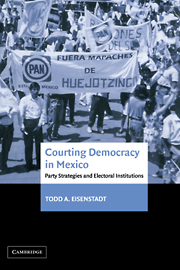Book contents
- Frontmatter
- Contents
- Figures and Tables
- Acknowledgments
- Courting Democracy in Mexico
- 1 Electoral Courts and Actor Compliance: Opposition-Authoritarian Relations and Protracted Transitions
- 2 Ties That Bind and Even Constrict: Why Authoritarians Tolerate Electoral Reforms
- 3 Mexico's National Electoral Justice Success: From Oxymoron to Legal Norm in Just over a Decade
- 4 Mexico's Local Electoral Justice Failures: Gubernatorial (S)Election Beyond the Shadows of the Law
- 5 The Gap Between Law and Practice: Institutional Failure and Opposition Success in Postelectoral Conflicts, 1989–2000
- 6 The National Action Party: Dilemmas of Rightist Oppositions Defined by Authoritarian Collusion
- 7 The Party of the Democratic Revolution: From Postelectoral Movements to Electoral Competitors
- 8 Dedazo from the Center to Finger Pointing from the Periphery: PRI Hard-Liners Challenge Mexico's Electoral Institutions
- 9 A Quarter Century of “Mexicanization”: Lessons from a Protracted Transition
- Appendix A Coding the Postelectoral Conflict Dependent Variable
- Appendix B Coding of Independent Variables
- Bibliography
- Index
3 - Mexico's National Electoral Justice Success: From Oxymoron to Legal Norm in Just over a Decade
Published online by Cambridge University Press: 22 September 2009
- Frontmatter
- Contents
- Figures and Tables
- Acknowledgments
- Courting Democracy in Mexico
- 1 Electoral Courts and Actor Compliance: Opposition-Authoritarian Relations and Protracted Transitions
- 2 Ties That Bind and Even Constrict: Why Authoritarians Tolerate Electoral Reforms
- 3 Mexico's National Electoral Justice Success: From Oxymoron to Legal Norm in Just over a Decade
- 4 Mexico's Local Electoral Justice Failures: Gubernatorial (S)Election Beyond the Shadows of the Law
- 5 The Gap Between Law and Practice: Institutional Failure and Opposition Success in Postelectoral Conflicts, 1989–2000
- 6 The National Action Party: Dilemmas of Rightist Oppositions Defined by Authoritarian Collusion
- 7 The Party of the Democratic Revolution: From Postelectoral Movements to Electoral Competitors
- 8 Dedazo from the Center to Finger Pointing from the Periphery: PRI Hard-Liners Challenge Mexico's Electoral Institutions
- 9 A Quarter Century of “Mexicanization”: Lessons from a Protracted Transition
- Appendix A Coding the Postelectoral Conflict Dependent Variable
- Appendix B Coding of Independent Variables
- Bibliography
- Index
Summary
It is my conviction that the president of the republic should not exercise any powers other than those explicitly conferred on him by the Constitution and the law….
Ernesto Zedillo (Mexican president, 1994–2000)It was by all accounts another day at the office for one of authoritarian Mexico's more modest parties seeking to contest yet another Party of the Institutional Revolution (PRI)–state victory in the summer of 1988. The tiny Authentic Party of the Mexican Revolution (PARM – usually a satellite of the PRI) had decided to contest extreme electoral fraud in congressional district 7 in the state of Guerrero. The PARM submitted its copies of the vote tallies to the new federal electoral court, with poll officials' signatures at odds with those on certified copies submitted by the Guerrero electoral commission. Blatant and extensive alteration of official results was acknowledged but then ignored in the verdict of the magistrates, who argued in the decision that while tampering was evident, the complaint was unfounded for failing to properly state the allegations, and that because the electoral court “facing the judicial impossibility of accessing the electoral packets which should be in the Chamber of Deputies, confronted a technical and legal impediment to determining which copy of the results is the real one” (Tribunal of Electoral Contention or TRICOEL RQ-007 resolution, 4).
- Type
- Chapter
- Information
- Courting Democracy in MexicoParty Strategies and Electoral Institutions, pp. 60 - 92Publisher: Cambridge University PressPrint publication year: 2003



